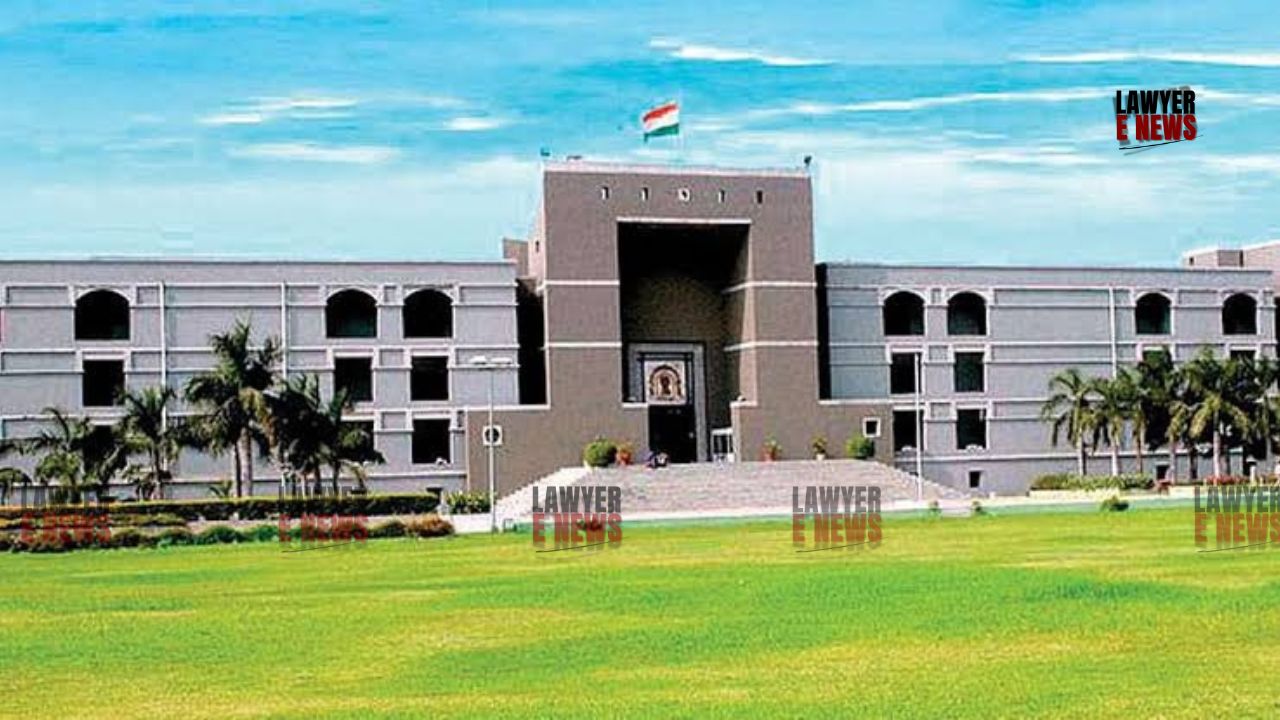-
by Admin
19 February 2026 3:14 PM



“No material on record suggests the applicant’s involvement; custodial interrogation is not required” — Gujarat High Court, in a noteworthy ruling granted anticipatory bail to a man accused under stringent provisions of the Gujarat Prohibition Act and the Bharatiya Nyaya Sanhita, 2023, citing lack of evidence of conscious possession, and emphasising that liberty cannot be curtailed merely on the basis of secret police information.
Justice Vimal K. Vyas, while allowing the application under Section 482 of the Bharatiya Nagarik Suraksha Sanhita, 2023, observed that the material on record was insufficient to justify the applicant’s custodial interrogation, and that the accused was not present during the raid, nor was any incriminating evidence directly linking him to the seized contraband.
“The applicant has been arraigned as accused No.8 only on the basis of secret inputs received by the police. At the time of the raid at the godown, he was not found with the conscious possession of liquor and there is no material which suggests his involvement in the alleged offence,” the Court stated, holding that custodial interrogation was not warranted.
Accusation Based Solely on Secret Input and Rent Agreement Signature
The case arose from an FIR registered at Santej Police Station, Gandhinagar, where police, acting on confidential information, conducted a raid at a godown and allegedly recovered liquor. The FIR invoked Sections 65(a), 65(e), 116-B, 81, 83, 98(2) of the Gujarat Prohibition Act and Sections 111(2)(b), 111(3), and 111(4) of the Bharatiya Nyaya Sanhita, 2023.
The applicant, Maulik @ Pappu Jagdishbhai Patel, was not present at the scene and was implicated solely because he had signed the rent agreement of the godown as a witness.
Appearing for the applicant, Senior Advocate Mr. Nirupam Nanavaty, submitted that the only link between the accused and the premises was his signature as a witness on the rent document. No other material connected him to the alleged storage or distribution of liquor. “The police have no case except secret input and a witnessed signature,” counsel argued, adding that there was no recovery, no conscious possession, and no custodial need.
The prosecution, through APP Mr. Rohankumar Raval, opposed the bail application, pointing to the seriousness of the offence and the statutory rigour of the Prohibition Act.
However, the Court disagreed with the prosecution’s objections, stating, “No connecting material has been found on record. The applicant’s role is too peripheral to justify custodial interrogation.”
Court Emphasises Bail Jurisprudence from Supreme Court
Justice Vyas underlined the constitutional right to liberty and cited three landmark judgments of the Supreme Court of India which have laid down the principles governing anticipatory bail:
Referring to Siddharam Satlingappa Mhetre v. State of Maharashtra (2011) 1 SCC 694, the Court reiterated that anticipatory bail should be granted liberally when the allegations are unsubstantiated, and custodial interrogation is not essential. The Court also invoked Gurubaksh Singh Sibbia v. State of Punjab (1980) 2 SCC 665, the foundational case on anticipatory bail in India, and Sushila Aggarwal v. State (NCT of Delhi) (2020) 5 SCC 1, where the Supreme Court clarified that anticipatory bail is not limited by time unless specific circumstances demand it.
“This Court has also taken into consideration the law laid down by the Hon'ble Apex Court… where it was held that anticipatory bail should not be denied merely because the offence is serious, particularly when the need for custodial interrogation is not made out,” the order notes.
“Expecting a Man to Face Arrest Merely for Being a Witness to a Rent Agreement is a Dangerous Precedent”: High Court
Justice Vyas expressed strong disapproval of the police’s approach in arraigning the applicant without establishing direct involvement:
“At the time of the raid, the applicant was neither present nor in possession of the contraband. Signing the rent agreement as a witness does not ipso facto imply complicity in the offence. This Court is of the view that personal liberty must not be sacrificed on the altar of presumption.”
The Court further noted that none of the documents submitted by the prosecution demonstrated that the applicant had any mens rea, or criminal intent, necessary to invoke penal liability under the Prohibition Act.
Conditions Imposed: Liberty Balanced With Safeguards
While granting anticipatory bail, the Court directed that the applicant shall be released on execution of a personal bond of ₹15,000 with one surety, and imposed several safeguards, including:
The applicant must cooperate with the investigation, report to the police station on the designated date, not influence any witnesses, refrain from leaving India without permission, and mark his presence before the police between the 1st and 5th of each month until filing of the chargesheet.
Importantly, the Court protected the fairness of the upcoming trial by observing, “At the trial, the Trial Court shall not be influenced by the prima facie observations made by this Court, while enlarging the applicant on bail.”
In granting anticipatory bail to Maulik @ Pappu Jagdishbhai Patel, the Gujarat High Court has once again reiterated that arrest is not a tool of punishment, especially where no evidence of guilt is present, and the liberty of an individual is at stake.
With a clear emphasis on judicial restraint, personal liberty, and evidentiary fairness, the Court ruled:
“Without any material indicating active involvement or conscious possession, preventive custody is unjustified. Liberty cannot be taken away merely on the basis of suspicion or secret intelligence.”
Date of Decision: June 4, 2025
